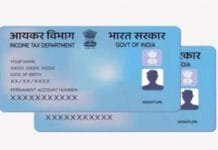INVC NEWS
New Delhi : Starting October 1, the Birth and Death Registration Act of 2023 elevates the importance of birth certificates in India to the level of Aadhaar cards. From late fees to state-specific processes, our guide offers comprehensive insights .
Intro: Big News Alert for All Indians!
Hey there! Have you heard? Starting October 1, your birth certificate is going to be super important in India, almost as important as your Aadhaar card. Why? Because the government has updated the Birth and Death Registration Act of 2023. So, let’s get you up to speed on what this means for you!
A Trip Down Memory Lane: The Aadhaar Card Era
First things first, let’s reminisce a bit about Aadhaar cards. These little 12-digit numbers have been doing a lot. Whether you’re setting up a bank account, getting a mobile phone, or applying for government services, your Aadhaar card was your go-to ID. But now, birth certificates will also become essential, especially if you’re applying for a new Aadhaar card.
Why Should You Care?
Why is this change such a big deal, you ask? Well, it’s like your birth certificate just got promoted. It’s not just a sheet of paper anymore; it’s going to be your main identification document for many services. Yup, that’s right, from school applications to getting married, this document is the new star player.
Don’t Miss the Deadline: Register Within 21 Days
So you’ve just welcomed a new member into your family—congratulations! Just remember, you have 21 days to register the birth and get the birth certificate. If you miss this window, you’ll have to go through some extra steps.
Late? Here’s What You’ll Face
- 21-30 days late: You’ll be fined Rs 2. Not too bad, right?
- 31 days to a year late: This time, you’ll need to pay Rs 5 and provide an affidavit and special permission.
- Over a year late: You’ll need to pay Rs 10 and present your case in front of a magistrate. Yikes!
One Country, Many Processes: The State Factor
Each state in India has its unique way of issuing birth certificates, although the basic steps are pretty similar. So make sure you check your state’s specific website and process.
Who’s Got the Stamp?
- In Cities: Health officers or town health officers are in charge.
- In Rural Areas: The head medical officer of your nearest government hospital will take care of it.
The How-To Guide: Getting Your Birth Certificate
- Step One: Go to the official website specific to your state or city.
- Step Two: Fill out the required forms and upload your documents.
- Step Three: Pay the fees online.
- Step Four: You’ll get a tracking code to check the application status.
- Step Five: Collect your certificate either in person or via mail.
Local Tips for the Savvy Applicant
Even though the core process is mostly the same across India, each state may have its own quirks. So it’s always a good idea to coordinate with your local Municipal Council to make sure you’re following the local norms.
The Bigger Picture: How This Affects India’s Economy
This isn’t just a policy change; it’s also a strategic move for India’s economic development. Imagine a more secure financial landscape where both banks and employers will also ask for your birth certificate for verification.
Wrapping Up: The Birth of a New Era in Identification
So there you have it! The new changes in the Birth and Death Registration Act of 2023 have given birth certificates a major role in your life. From now on, they’re not just another document but a key player in your personal identification portfolio.
















